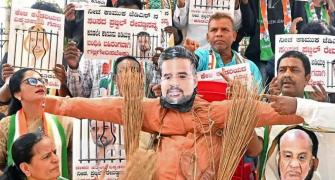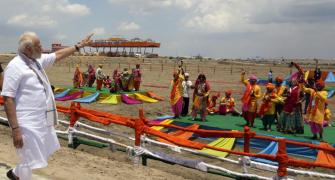The population of vultures, nature's scavengers and rodent controllers, has fallen to a few thousands in a decade's time One of the reasons being a veterinary drug found in cattle carcasses that the birds feed on, experts say.
The use of a common painkiller, Diclofenac, for treating cattle and livestock has reportedly caused the death of more than 90 per cent vultures in India.
Wildlife officials and bird lovers in West Bengal have begun a census of vultures, beginning first with the state's northern region. Volunteers have fanned out into vulture nesting and feeding sites and are following forest department-prescribed headcount parameters to avoid duplication.
West Bengal has even moved on breeding vultures in captivity with help from London's Royal Bird Society. The situation is so grim that bird lovers fear that the state has only about 200 vultures, including the nearly 50 flying in the skies over Kolkata.
The dramatic decline in three species of vultures came to notice about a decade ago when researchers saw a flock of vultures falling down from a tree in a bird sanctuary in northern India.
"After a few days, the vultures died," West Bengal chief conservator of forests V K Yadav said. "Veterinary researchers found the vultures suffered kidney failure and died after building up high levels of Diclofenac from carcasses of livestock."
Hundreds of vultures once circled above a sacred area in one of India's posh suburbs, waiting to feed on the remains of followers of an ancient religion that does not allow its dead to be buried or burned.
Older members of the small-but-prominent Zoroastrian Parsi community of Mumbai say it usually took only half an hour for the vultures to finish their part of the ritual, cleaning a dead body of flesh deemed to be spiritually contaminated. But urban development and accidental poisoning have almost wiped out the birds, leaving Parsis divided on how best to treat the dead.







